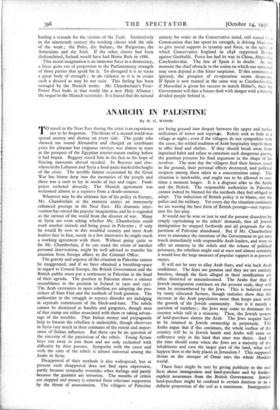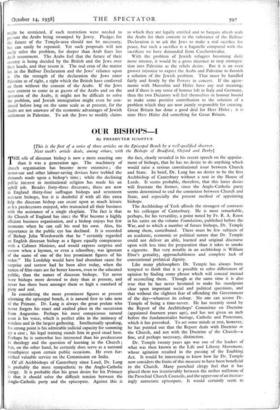ANARCHY IN PALESTINE
By H. G. WOOD
Whatever may be the ultimate fate of his policy in Europe, Mr. Chamberlain at the moment enjoys an immensely enhanced prestige in the Near East. His dramatic inter- vention has stined.the popular imagination, and he is regarded as the saviour of the world from the disaster of war. Many in Syria are even asking whether Mr. Chamberlain could work another miracle and bring peace in Palestine ; if only he would fly over to this troubled country and meet Arab leaders face to face, surely in a few interviews he might reach a working agreement with them. Without going quite so far Mr. Chamberlain, if he can stand the strain of another personal intervention, might be well advised to transfer his attention from foreign affairs to the Colonial Office.
The gravity and urgency of the situation in Palestine cannot be exaggerated, and if we have obtained a breathing-space in regard to Central Europe, the British Government and the British public must put a settlement in Palestine at the head of -their agenda. The position in Palestine shows a sinister resemblance to the position in Ireland in 192o and 1921. The Arab extremists in open rebellion are adopting the pro-. cedure of Sinn Fein and the methods of Irish gunmen. The authorities in the struggle to -repress disorder are indulging in reprisals reminiscent of the black-and-tans. The rebels cannot be dismissed as bandits and gangsters, though men of that stamp are either associated with them or taking advan- tage of the troubles. That Italian money and propaganda help to foment the rebellion is undeniable, though observers in Syria vary much in their estimates of the extent and impor-. tance of Italian influence. But there can be no question of the sincerity of the patriotism of the rebels. Young Syrian boys run away to join them and are only reclaimed with difficulty by their parents. Sympathy . with the cause and with the aims of the rebels is almost universal among the Arabs in Syria.
Disapproval of their methods is also widespread, but at present such disapproval does not find open expression, partly because sympathy overrides other feelings and partly because the gunmen are terrorists. The mouths of critics are stopped and money is extorted from reluctant supporters by the threat of assassination. The villagers- of Palestine are being ground into despair between the upper and nether millstones of terror and reprisals. Rebels seek to hide in a village at night ; even if the villagers do not sympathise with the cause, the settled tradition of Arab hospitality impels them to offer food and shelter. If they should break away from ingrained habit and refuse to entertain such dangerous guests, the gunman presents his final argument in the shape of his revolver. The next day the villagers find their houses razed to the ground, their personal effects destroyed, and political suspects among them taken to a concentration camp. The situation is intolerable, and ought not to be allowed to con- tinue a moment longer. It is a disgrace alike to the Arabs and the British. The responsible authorities in Palestine cannot indeed be blamed for the methods they feel obliged to adopt. The indecision of British policy is to blame, not the police and the military. Yet every day the situation continues we are wasting the best form of British prestige—our reputa- tion for fair-play.
It would not be wise or just to end the present disorders by simply capitulating to the rebels' demands, that all Jewish immigration be stopped forthwith and all proposals for the partition of Palestine abandoned. But if Mr. Chamberlain were to announce the intention of the Government to get into touch immediately with responsible Arab leaders, and were to offer an amnesty to the rebels dnd the release of political prisoners, the rebellion might end at once and almost certainly it would lose the large measure of popular support it at present enjoys.
It will not be easy to allay Arab fears, and win back Arab confidence. The fears are genuine and they are not entirely baseless, though the facts alleged in their justification are often distorted or misunderstood. -The Arabs fear that if Jewish immigration continues on the present scale, they will soon be outnumbered by the Jews. This is believed even by many educated Syrians, though statistics show that the increase in the Arab population, more than keeps pace with the growth of the Jewish community. Nor is it merely a question of numbers.; the Jews. may come to dominate the country while still in a minority. Then, the. Jewish system of land-purchase alarms the Arab. The Jews acquire land to be retained- in Jewish ownership in perpetuity. The Arabs argue that. if this continues, the whole _surface of the country will be in Jewish hands and Arabs will exist on sufferance only in the land that once was theirs. And if the time should come when the Jews are a majority of the inhabitants and own the larger part of the land, what will happen then to the holy places in Jerusalem ? This supposed threat to the mosque of Omar stirs the whole Moslem world.
These fears might be met by giving publicity to the real facts about immigration and land-purchase and by further explicit assurances from the British Government. Jewish land-purchase might be confined to certain districts or to a definite proportion of the soil as a maximum. Immigration might be restricted, if such restriction were needed to prevent the Arabs being swamped by Jewry. Pledges for the future of the Temple-area should not be necessary, but can easily be repeated. Yet such proposals will not really solve the problem, for deeper than Arab fears lies Arab resentment. The Arabs feel that the future of their country is being decided by the British and the Jews over their heads, and they resent it. The real crux of the matter lies in the Balfour Declaration and the Jews' reliance upon it. On the strength of the declaration the Jews enter Palestine as of right, a right which the British have conferred on them without the consent of the Arabs. If the Jews were content to come in as guests of the Arabs and on the invitation of the Arabs, it might not be difficult to solve the problem, and Jewish immigration might even be con- tinued before long on the same scale as at present, for the Arabs are not unaware of the economic advantages of Jewish settlement in Palestine. To ask the Jews to modify claims to which they are legally entitled and to bargain afresh with the Arabs for their consent to the substance of the Balfour Declaration is to ask the Jews to make a real sacrifice for peace, but such a sacrifice is a bagatelle compared with the sacrifices we have demanded from Czechoslovakia.
With the problem of Jewish refugees becoming daily more intense, it would be a gross injustice to stop immigra- tion into Palestine as the rebels desire. But it is an even grosser injustice to expect the Arabs and Palestine to furnish a solution of the Jewish problem. That must be handled fairly and firmly by the Powers in concert. If the agree- ments with Mussolini and Hitler have any real meaning, and if there is any sense of honour left in Italy and Germany, then the two Dictators will feel themselves in honour bound to make some positive contribution to the solution of a problem which they are now jointly responsible for creating. Great Britain has done a good deal for Herr Hitler ; it is time Herr Hitler did something for Great Britain.



















































 Previous page
Previous page